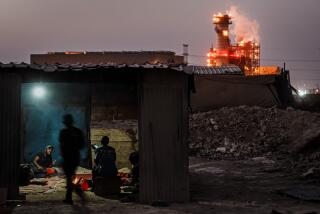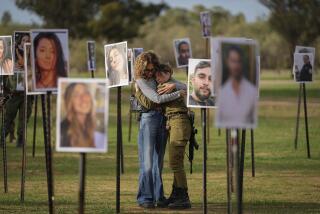Kuwaiti Reprisal Killings Continue : Violence: Western officials grow increasingly frustrated at government’s inability to control abuses.
- Share via
KUWAIT CITY — The man wore only dirty white boxer shorts. His black pants were used to tie his hands behind him. His pink shirt was used as a blindfold. Nothing covered the black bruises on his muscular arms or the crudely stitched gash in his forehead.
But sometime early Sunday, he was taken to an underpass on the Magreb Highway, the capital’s main artery, and forced to kneel. Then he was shot in the head, left shoulder and chest, and propped upright for passing traffic to see, bullet holes and blood in the baby-blue wall behind him
“Every day now like this,” said Naif al Adjami, a Red Crescent emergency worker, as he helped load the corpse in his truck. “Sometimes one, sometimes five. Too much death.”
U.S. and international human rights officials said the bodies of 20 to 30 people have been found tortured or shot to death, and many more are presumed dead in what increasingly appears as blatant human rights abuses and reprisals by unrestrained Kuwaiti military and resistance forces against suspected collaborators.
The officials now say that 300 to 600 Palestinians, North Africans and other non-Kuwaitis are unaccounted for in Kuwait city since liberation by allied forces 19 days ago. Kuwaiti soldiers have dumped hundreds of others on Iraq’s border, some badly beaten or tortured.
The Western officials are increasingly frustrated at the newly restored Kuwaiti government’s apparent inability to control the abuses in a war-torn city with an estimated half a million weapons still unaccounted for.
“The ministerial (Cabinet) level is fully aware they can’t afford to let this drag on or the situation will explode in their faces,” said Walter Stocker, head of the International Committee of the Red Cross delegation here. “It’s suicide. But how far are they in control? You get out of where the government is sitting, and it’s out of control.”
A ranking U.S. official said that Palestinian and other prisoners now are being held at six Kuwaiti army brigade headquarters, two division headquarters and a military prison near the army chief of staff’s office, as well as at schools and police stations.
“It’s very evident that there are grave human rights problems,” said Andrew Whitley, executive director of Middle East Watch, a New York-based human rights organization.
The degree of direct Kuwaiti government complicity remains to be established, “especially at the highest levels,” he said.
“But the army is undoubtedly involved in abductions, interrogations, often brutally, and deportation of Palestinians and members of nationalities whose governments opposed the allied alliance,” he said.
Whitley, who watched a Kuwaiti military police officer unload 23 Algerians, Somalis, Sudanese and Tunisians on the Iraqi border Saturday, said Kuwait is violating international law by the use of arbitrary arrests, collective punishment and summary deportation without due process.
“And there is a disavowal of responsibility at all levels,” Whitley said.
He estimated that 3,000 people are unaccounted for, about half of them Palestinians. He said that 600 are known to be detained by military forces and that “300 are missing, presumed dead.”
The ranking U.S. official, who has studied the problem, estimated the number of people “who were tortured or beaten--or we just can’t find, at the low end, 300--at the high end, 600.”
U.S. officials, who have already protested to senior members of Kuwait’s government, went further Sunday.
U.S. Ambassador Edward W. (Skip) Gnehm accompanied Abdul-Rahman Awadi, the influential minister of state for Cabinet affairs, to Kuwait’s northern border to personally interview at least two men who said they had been badly beaten by the Kuwaiti military and then dumped on the desolate border.
Moments before leaving for the border, Awadi had denied that such deportations were occurring.
“I don’t think this is true,” he told a press conference about the deportations. “ . . . This is very unfortunate that I’ve been hearing this, but I have not seen evidence.”
Awadi called the country’s huge Palestinian population, now less than half the estimated 350,000 that it numbered before the war, “the dearest Arabs we have” and promised they will retain “the exact rights . . . as any other Arab.”
He denied any government purge or torture campaign against Palestinians. “We know there are some Palestinians who have been collaborators,” he said. “They are going to be definitely tried according to the law.”
Awadi said people have become “trigger happy” from the war and because of weapons abandoned by retreating Iraqi troops. “With half a million pieces of arms around, you expect some problems,” he said.
Partially as a result of Awadi’s trip to the border, Kuwait gave the green light Sunday for delegations from the Geneva-based International Organization of Migration and the Office of the U.N. High Commissioner for Refugees to visit the country and assist in repatriation.
The Egyptian Embassy also evacuated at least 250 Egyptians stuck at the Iraqi border or living in a squalid Red Crescent refugee camp nearby, ferrying them back to Kuwait city in trucks.
U.S. Army Maj. Andrew Natsios, who has visited jails as executive officer of the Kuwaiti Task Force, said the forced deportations were a “very good sign.”
“That means they’re not shooting them,” he said. He estimated that 400 to 700 people have now been dumped on the border.
In a meeting Saturday, senior Kuwaiti officials warned the military to stop the beatings and torture immediately, according to a U.S. official
“We’ll know in a few days if it’s having an effect,” he said. “Personally, I think it’s going to continue on some scale for a long time.”
Ironically, the reprisals have worsened the city’s other problems. Many Palestinians were key professionals, technicians, shopkeepers and other workers now needed to run the devastated emirate. Most are instead hiding in their homes, afraid to come out.
In Hawalli, the city’s largest Palestinian quarter, an elderly man approached a reporter to plead that American forces not leave.
“The Kuwaiti soldiers told us when the Americans leave, we will have a Black September here,” he said fearfully, in a reference to Jordan’s 1972 purge and expulsion of Palestinians.
The worst, and perhaps most understandable, abuses are against Iraqis still held captive by the Kuwaiti resistance or military, according to several officials.
Even the American soldiers are disgusted, the U.S. official said. “If they find an Iraqi now, they won’t turn him over to the Kuwaitis.”
The role of American troops remains unclear, however. The U.S. official said that Special Forces soldiers, who have been seen at several of the detention centers, have “been a restraining force.”
“We have had three cases where Special Forces guys have physically removed people who were at risk,” he said. “A couple have said they’ve seen (torture) and they’ve stopped it.”
In one case this week, Red Cross delegates said, they found a U.S. Army captain and sergeant when they went to the Salmiya High School after it was identified as a torture center by a Palestinian who had shown up with cattle brands burned in his flesh.
The Americans said they were helping to integrate resistance members into the Kuwaiti army and denied any knowledge of torture in the building, the Red Cross said.
The Red Cross’s Stocker said that whatever the American role is, U.S.-led allies bear responsibility to help stop the abuses and provide for refugees.
“We have to remind them of their responsibilities under international law,” he said. “If you want to make war, you have to help afterwards.”
But a former resistance leader, who asked not to be identified, told a reporter that he and his friends intend to continue searching and giving “summary justice” to collaborators.
“We look for them, and we kill them,” he said flatly. “Really that is the best way.”
Last Monday, he said, resistance members executed a Kuwaiti man who he said had worked at an Iraqi-run newspaper and read official Iraqi announcements on TV during the seven-month occupation.
He said the man, whom he identified as Ahmed Assal Shumairy, had been given official letters of transit to pass Iraqi military checkpoints and was allowed to carry an assault rifle.
He said Shumairy frequently boasted that he was driving cars stolen from wealthy Kuwaitis. Working for a newspaper, he also was able to help Iraqi forces locate Kuwaiti police and army officers in hiding, the man said.
“Everybody was looking for him” after liberation, he said.
Last Monday, he said, resistance members spotted him driving in the Bayan area and took him to an unidentified house where 12 people were waiting.
“We took him to the people,” the man said. “We said he cooperated with the Iraqis and he was very dangerous, and a lot of Kuwaitis have been killed and a lot of officers have been arrested because he helped them,” the man said.
He defended the subsequent execution, as well as other murders of suspected collaborators. He said he is still collecting evidence against others.
“Anybody who has cooperated with the Iraqis, they are really to be killed,” he said. “They should be killed (under) Islamic law. . . . In Islam, when somebody kills somebody, he kills himself.”
Times staff writer Kim Murphy contributed to this story.
More to Read
Sign up for Essential California
The most important California stories and recommendations in your inbox every morning.
You may occasionally receive promotional content from the Los Angeles Times.











